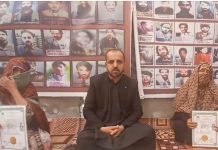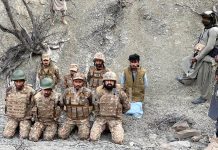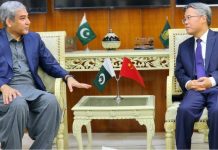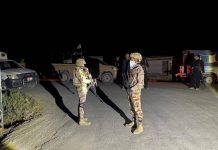On 5 October 2017, the Unrepresented Nations and Peoples Organization (UNPO) in collaboration with the World Baloch Organization (WBO) convened a conference on the deteriorating human rights and security situation in both the Iranian and Pakistani held parts of Balochistan and the geopolitical complexities affecting the region. The conference entitled “Scales of Injustice: The Geopolitics of Business, State-Sponsored Extremism and the Fall of Democracy in Balochistan” took place at the Hill Center at the Old Naval Hospital.
The conference heard speeches from Nasser Boladai (President of UNPO), Senator Paul Strauss (Sen. District of Columbia), Bhawal Mengal (WBO), Christine Fair (Georgetown University) and T. Kumar (Amnesty International USA).
Opening the conference, Nasser Boladai welcomed the participants and gave an overview of the history of Balochistan, highlighting the region’s geopolitical importance and recent incidents of gross human rights violations perpetrated by Iranian security forces against Baloch civilians.
Senator Paul Strauss (District of Columbia, Shadow) then commended the platform provided by UNPO for unrepresented nations and peoples to raise their concerns at the international level and to learn from each other’s struggles. He pointed out that while, on first glance, the struggle of the people of Balochistan might not have much in common with the situation of the unrepresented citizens of the District of Columbia, the common denominator is the importance of peoples’ right to decide over their own destiny.
In a video statement, WBO representative Bhawal Mengal then elaborated on the importance of raising the plight of the Baloch people in places such as Washington, DC, urging the international community to condemn state-sponsored terror in Pakistan and stand up for the human rights of the Baloch people.
The first talk by Christine Fair then looked at the geopolitics behind the Balochistan-Pakistan conflict and in particular at the impact of the China – Pakistan Economic Corridor (CPEC) which, according to her, is an “exploitative corridor” rather than an economic one and is implemented in a way that seems to benefit everybody but the people actually living in the area. Professor Fair also highlighted the fact that Islamabad uses forms of political Islam to undermine those strands of the Baloch national movement which try to peacefully advocate for change towards democracy, respect for human rights and self-determination in the region.
Following the speech of Christine Fair, the floor was given to T. Kumar, International Advocacy Director at Amnesty International USA, who stressed that in Balochistan, Pakistani security forces do not even try to conceal their ruthless strategy of terrorizing the Baloch population – a behaviour, that despite getting worse over the past few years, hardly gets any domestic or international attention. Enforced disappearances in particular are being carried out in broad daylight, creating a constant sense of fear among the local population.
The event also allowed for a fruitful exchange of views following the official programme, including remarks on the similarly deplorable situation of other minority groups in Pakistan, such as Sindh and Pashtun populations. An obvious conclusion to be drawn from the conference is that – while the event was a step forward to raise awareness of the Balochs’ plight – for the situation to change, the dialogue has to be kept alive and concerted efforts and swift action by all actors involved are urgently needed.






























